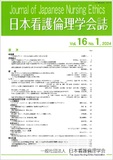Japanese
English
- 販売していません
- Abstract 文献概要
- 参考文献 Reference
近年、看護師に対する患者・家族からのセクシュアル・ハラスメント等が深刻化している。管理者が、組織的問題として解決する方策を立案する手がかりを得ることを目的とし、無記名自記式質問紙調査を実施した。セクハラ体験者中、自由記述があった242名を分析対象とした。分析の結果、Hibinoらによる11type以上の内容が抽出された。また、「感情」や「行動」の記述があった77名分を分析した結果、「感情」に関して、【仕方ないという思い】、【恐怖・不快感】、【感情労働への思い】の3カテゴリーが、「行動」に関して、【ことばや態度による拒絶】、【受け流す・かわす】、【組織やスタッフ等の対応】、【対応の困難さ】の4カテゴリーが抽出された。さらに計量テキスト分析の結果、ことばによるセクハラや、身体を「触る」セクハラが多かった。その背景として感情労働という職業上の特徴があることや、組織的対策が急がれることが示唆された。
In recent years, sexual harassment of nurses by patients and their families has become a serious problem. An anonymous self-administered questionnaire survey was conducted to obtain clues for managers to formulate measures to solve organizational problems. Responses of 242 subjects who provided free descriptions were analyzed. Contents were extracted over 11 categories of responses reported in studies by Hibino et al. Analysis of responses by 77 people who described emotions and behavior identified three categories of feelings(feelings that can't be helped, fear/discomfort, and thoughts on emotional labor)and four categories of behavior(rejection by word or demeanor, parry/dodge, organization and staff response, and diffculty in dealing with). Quantitative text analysis revealed that verbal and touching-type forms of sexual harassment were common. The results suggest that the background to sexual harassment is an occupational characteristic of emotional labor, and that organizational countermeasures are urgently needed.
Copyright © 2024, The Japan Nursing Ethics Associatin. All rights reserved.


